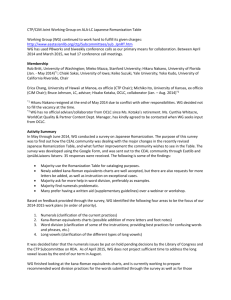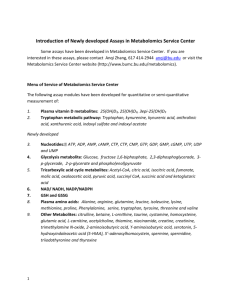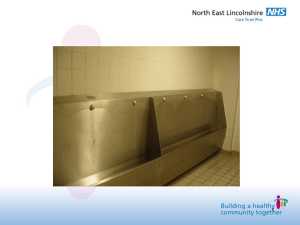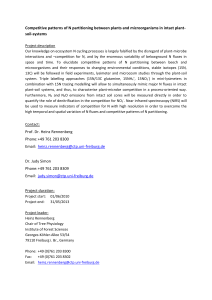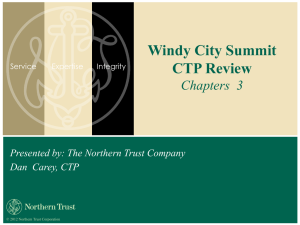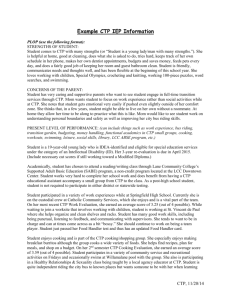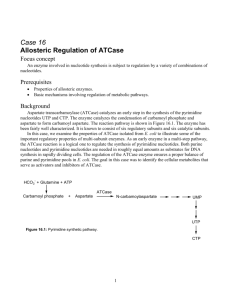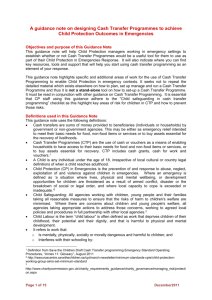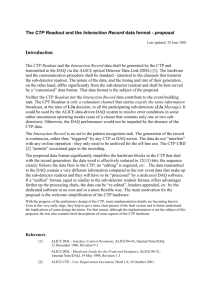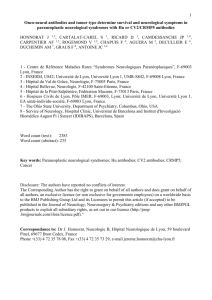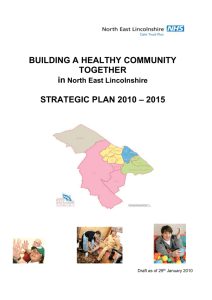Enter Project Title in Doc Properties from toolbar
advertisement
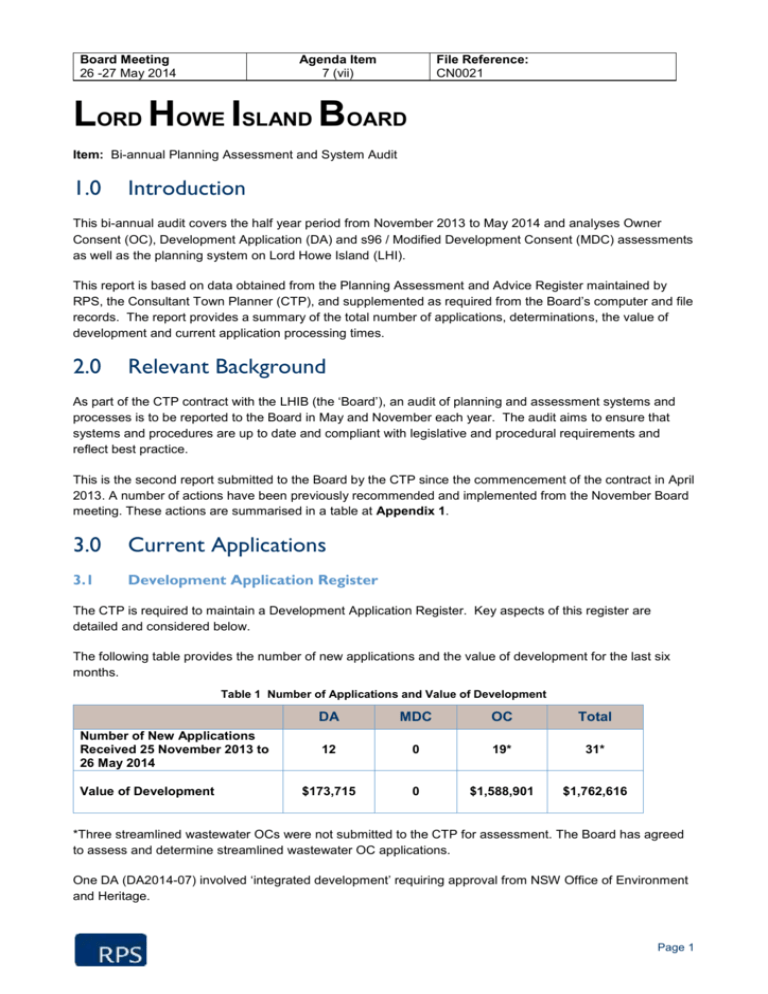
Board Meeting 26 -27 May 2014 Agenda Item 7 (vii) File Reference: CN0021 LORD HOWE ISLAND BOARD Item: Bi-annual Planning Assessment and System Audit 1.0 Introduction This bi-annual audit covers the half year period from November 2013 to May 2014 and analyses Owner Consent (OC), Development Application (DA) and s96 / Modified Development Consent (MDC) assessments as well as the planning system on Lord Howe Island (LHI). This report is based on data obtained from the Planning Assessment and Advice Register maintained by RPS, the Consultant Town Planner (CTP), and supplemented as required from the Board’s computer and file records. The report provides a summary of the total number of applications, determinations, the value of development and current application processing times. 2.0 Relevant Background As part of the CTP contract with the LHIB (the ‘Board’), an audit of planning and assessment systems and processes is to be reported to the Board in May and November each year. The audit aims to ensure that systems and procedures are up to date and compliant with legislative and procedural requirements and reflect best practice. This is the second report submitted to the Board by the CTP since the commencement of the contract in April 2013. A number of actions have been previously recommended and implemented from the November Board meeting. These actions are summarised in a table at Appendix 1. 3.0 Current Applications 3.1 Development Application Register The CTP is required to maintain a Development Application Register. Key aspects of this register are detailed and considered below. The following table provides the number of new applications and the value of development for the last six months. Table 1 Number of Applications and Value of Development Number of New Applications Received 25 November 2013 to 26 May 2014 Value of Development DA MDC OC Total 12 0 19* 31* $173,715 0 $1,588,901 $1,762,616 *Three streamlined wastewater OCs were not submitted to the CTP for assessment. The Board has agreed to assess and determine streamlined wastewater OC applications. One DA (DA2014-07) involved ‘integrated development’ requiring approval from NSW Office of Environment and Heritage. Page 1 A further DA (2014-10) will be ‘integrated development’ requiring approval from NSW Office of Environment and Heritage, however the Heritage Impact Statement is not finalised yet. One OC (2014-15) was submitted to the Board but was withdrawn by the applicant. At the time of writing this report, 1 x DAs (DA2014-10) and 1 x OC (OC2014-22) have been submitted to the Board but are on hold for further information from the applicant. Appendix 2 provides a detailed breakdown of the applications that have been received by the Board during the bi-annual audit period. 3.2 Land Use Zones The majority of the 12 x DA’s and 19 x OC’s were proposed in the Settlement zone. Notable exceptions include: OC2014-13 for repairs and maintenance to an existing heritage boatshed located within the Environmental Protection Zone. OC2014-14 for construction of a glass house and refurbishment of nursery shed located within a Special Use Zone. OC2014-15 for the construction of an awning at the Golf Club located within the Recreation Zone. OC2014-27 for alterations and additions to an existing heritage boatshed located with the Environmental Protection Zone. DA2014-10 for demolition and construction of external laundry room located within a Special Uses Zone. 3.3 Planning Enquires The Board’s CTP deals with a number of pre-lodgement and post-lodgement planning enquiries as well as providing advice to various Board staff in respect of town planning matters as they arise. The CTP and the Board’s Manager Environment and Community Development have at least one teleconference a fortnight to discuss relevant current issues along with regular phone and email communication. 4.0 Application Processing Times 4.1 Application processing times Application Response DAs Average DA processing time from lodgement to issue of Notice of Determination 16.4 Days* Number of additional information requests 9 out of 12 applications OCs Average OC processing time from lodgement to issue of Notice of Determination 13.4 Days* Number of additional information requests 7 out of 19 applications *average excludes ‘stop the clock’ time where the CTP was awaiting response to requested additional information Page 2 The Environmental Planning and Assessment Regulation 2000 (EP&A Regs) states: …the application is taken to be refused if a consent authority has not determined the application within the deemed refusal period, being: (a) 40 days, except in the case of development referred to in paragraph (b) or (c), or (b) 60 days, in the case of: (i) designated development, or (ii) integrated development (other than integrated development that, pursuant to State Environmental Planning Policy No 62—Sustainable Aquaculture, is Class 1 aquaculture development), or (iii) development for which the concurrence of a concurrence authority is required, or (c) 90 days, in the case of State significant development. The average time for all DA and OC applications complies with the statutory 40 day deemed refusal period for standard applications. It is noted the average time is less than half of the expected time for determination. In comparison, the days on average to process a DA at the time of the last bi-annual report compared to this annual report went from 27 days to 16.4 days, and OCs went from 35.6 days to 13.4 days. Therefore, the processing time has greatly improved within this period. In comparison to the state average, the days on average to process a DA across all Council’s in NSW in the 2010/2011 financial year, excluding stop-the-clock provisions, was 45 days (Department of Planning and Infrastructure, 2011). The average the since November has been 16.4 days, greatly under the state average. It is noted that four on-site wastewater system upgrade applications were lodged in April 2014. All four of these applications required further information to complete the assessment. The average processing time from lodgement to DA assessment report forwarded to the Board, excluding the ‘stop the clock’ time, was 2 days. Given the requirement that existing systems to be compliant with the Board’s On-Site Wastewater Management Strategy by April 2016 and that majority of these applications are generally minor in nature, the CTP have expedited these applications. The CTP will continue to expedite the assessment reports for these applications to facilitate the upgrade of these systems across the Island. Similarly, proposed solar panel systems that are minor in nature are also expedited in the assessment process. It is noted that one of the DAs included in the processing time was uncharacteristic. This application relates to subdivision DA2014-05. The application was assessed during a two week shut down period of our offices over the Christmas and New Year break. Also, the time between the completion of the assessment report and the Board meeting date was 26 days. With the reduction of the shut down period and the time between the completion of the report and Board meeting, the processing time for the application goes from 65 days to 25 days. If we were to include this revised timeframe, the average DA processing time would go from 16.4 days to 13.5 days. 4.2 Potential improvements for application processing time As discussed in the last bi-annual report, a recommendation was made to provide more frequent Board meetings. An out-of-session Board meeting was conducted in April 2014. This Board meeting allowed three applications to be determined rather than having to wait an additional month for the next scheduled Board meeting. Page 3 It is recommended that out-of-session Board meetings continue to be held to facilitate the processing times of applications which need to determination by the full Board. Changes to the delegation role of the Board’s CEO and Chairperson to grant consent to a broader range of applications should continue to be investigated as appropriate. Since the last bi-annual audit the Board has been working with the Office of Environment and Heritage to clarify and broaden exemptions under s57(1) of the Heritage Act 1977. This would facilitate the timeframe for the determination of specific applications, typically those where the property is listed as a heritage item at Schedule 2 of the LHI Local Environmental Plan 2010 (LEP 2010) and where the development would not have a heritage impact. The Heritage Council approved the draft Order in April 2014, and are awaiting legal review before it is made. 4.3 Transferring Data The external File Transfer Protocol (FTP) site has been in operation since April 2013. The Board has notified the CTP for each application which is uploaded. This has allowed the CTP to begin the assessment process shortly after lodgement, helping improve the processing time. No concerns have been raised to the transferring of data via FTP site. 4.4 Advertising Currently, all Development Applications are advertised, with the exception of minor developments that, in the opinion of the Board, are of minimal social and environmental impact. These applications are not publicly notified, however adjoining leaseholders are provided with written notice and given seven (7) days to comment. This exception has been applied to solar panel and wastewater installations. It is recommended that the Board continue to apply the exemptions to advertising of development applications that involve minor development as appropriate. 5.0 Quality of Pre-lodgement Planning Advice There have been few applicants that have requested pre-lodgement planning advice from the CTP. No concerns have been registered with the LHIB in respect of the timeliness or quality of this advice. The CTP believes there is a high quality of pre-lodgement advice provided to the Board and applicants. The quality of development applications, which is discussed in Section 6.0 below, could be improved with more instances of pre-lodgement planning consultation between the application and the CTP. Opportunities to improve this process should be investigated. 6.0 Quality of Development Applications The CTP continue to have concerns regarding the quality of DAs submitted to the Board resulting in possibly avoidable additional information requests and activation of the stop-the-clock provisions. Prior to the submission of a DA each application completes the OC process. At this stage of the process an advisory note is included in the OC approval where additional information is required in addition to the information that is outlined in the DA checklist. The CTP believes there needs to be greater emphasis on the applicant to provide the information outlined in the advisory note prior to the DA being accepted by the Board. This is also highly important for wastewater and solar panel system applications, which require a fast turnaround time. Page 4 The DA checklist has recently been amended to include that any items requested in an advisory note of the relevant OC approval be required at the time of DA lodgement. It is also recommended the Board not accept DAs which are lodged without the necessary information. The quality of information could also be improved with increased pre-lodgement consultation between the applicant and the CTP as discussed at Section 5.0. 7.0 Update on Planning Bill 2013 The Planning Bill 2013 (Bill) passed through the lower house on the 30 October 2013 however the Bill was amended significantly when it reached the Upper House. The Upper House made the following key amendments: Removing the ‘code assessment’ streamlined development pathway Repeal mining rules Reinstate affordable housing provisions for new developments Following these significant changes, the Lower House made the decision on 28 November 2013 to defer the debate on the Bill till after 2014. On 28 February 2014, the then Minister for Planning and Infrastructure Brad Hazzard confirmed that the Bill remains in the NSW Parliament and discussions with stakeholders are continuing. There has been no update on the Bill since this time. 8.0 Changes to Government On 24 February 2014, the former Department of Planning and Infrastructure (DoPI) changed to ‘Planning and Infrastructure’, a public service executive agency related to the Department of Premier and Cabinet. On 16 April 2014, the NSW Premier Barry O’Farrell resigned and shortly thereafter Mike Baird was appointed as the new NSW Premier. Since his appointment, a number of government departments have been restructured. The former ‘Planning and Infrastructure’ became the Department of Planning and Environment with Pru Goward named as the new Planning Minister. The role of Director General of Planning and Infrastructure was abolished. The new role of Secretary will have a wider responsibility to serve three minsters – Planning, Environment and Heritage and Local Government. All LHI LEP related planning matters such as amendments to the instrument are unlikely to change in the near future. 9.0 Changes to LEP On 11 April 2014, the then Planning and Infrastructure published the amendment to LHI LEP 2010 which involved the rezoning of Portion 30 (held under perpetual lease by Mr T Douglass) and Portion 279 (the former LHIB Nursery) from Zone 5 Special Uses to Zone 2 Settlement. On 25 February 2014, the then Planning and Infrastructure granted Gateway Determination for the rezoning of Portions 123 and 176. The proposal involves the rezoning of part Portion 123 and 176, adjacent Capella Lodge, from Zone 1 Rural and Zone 5 Special Use to Zone 2 Settlement. The commencement of this amendment is imminent. Page 5 10.0 Conclusion The average DA and OC processing time for has reduced further from the last audit, improving the processing time. The CTP provides a number of recommendations at Section 10.0 to improve the procedures and efficiencies of development applications. Changes to the structure of NSW government have occurred. 11.0 Recommendation It is recommended that the Board: (a) Note the information regarding applications assessment for the period 25 November 2013 to 26 May 2014 in the Bi-annual Planning Assessment & System Audit. (b) Continue to provide out-of-session Board meetings to facilitate the processing time for applications that require approval by the full board. (c) Continue to investigate opportunities to broaden the conditions which limit the delegation role of the Board’s CEO and Chairperson to grant development consent as appropriate. (d) Continue to apply the exemptions to advertising of development applications that involve minor development as appropriate. (e) Reject DA applications which are lodged without the necessary information. (f) Finalise the Order under s57(1) of the Heritage Act 1977 to clarify and broaden exemptions. Prepared Peter Mangels LHI Consultant Town Planner Approved Penny Holloway Chief Executive Officer Page 6 Board Meeting 26 -27 May 2014 Agenda Item 7 (vii) File Reference: CN0021 Appendix 1 Previous Resolutions Board Resolution Action Provide more frequent Board meetings Seek changes to the conditions which limit the delegation role of the Board’s CEO and Chairperson to grant development consent. Not commenced. The DA checklist be amended to include that any items requested in an advisory note of the relevant OC approval be required at the time of DA lodgement. Investigate the applicability of the current order, which provides exemptions for certain development that would normally require a Section 60 approval, on commencement of the new Planning Act. . Currently in final stages. Page 2

